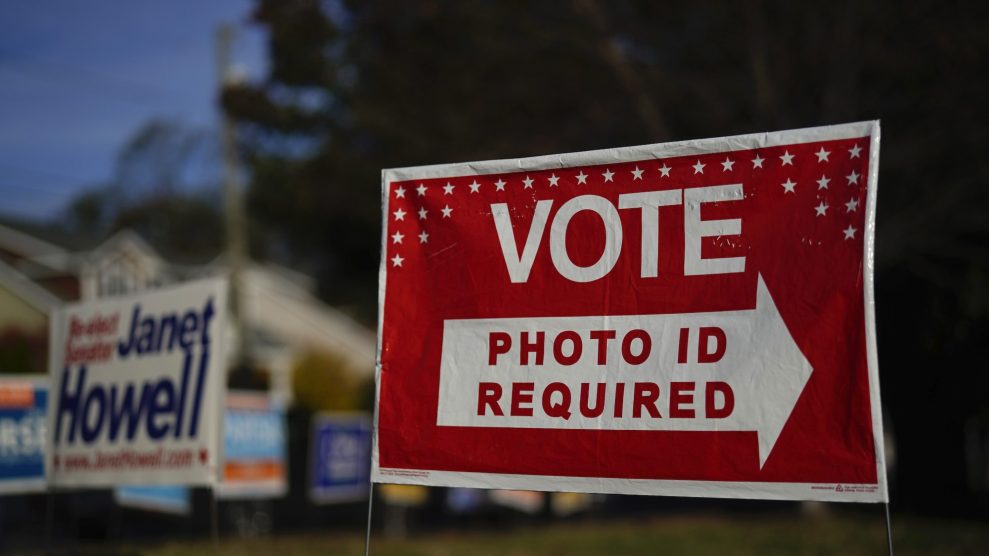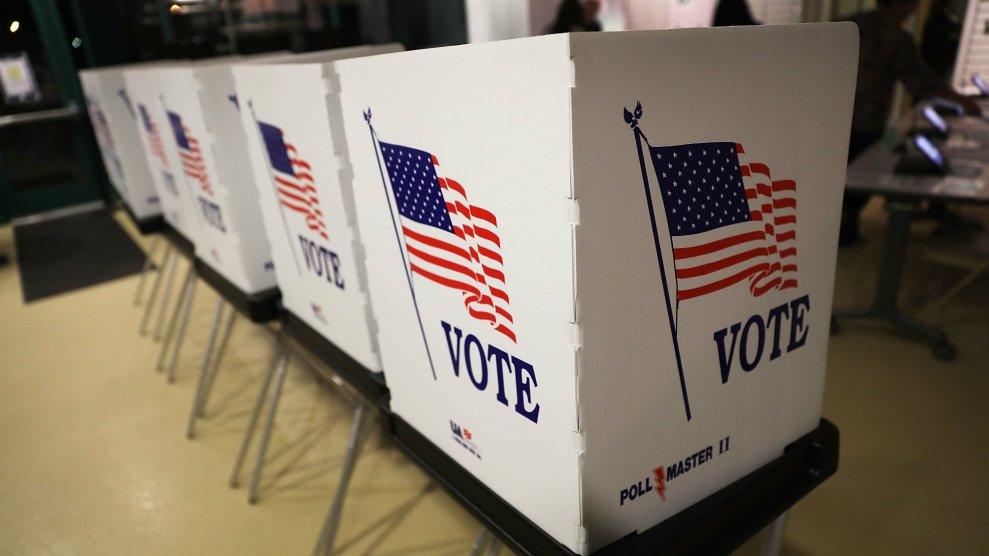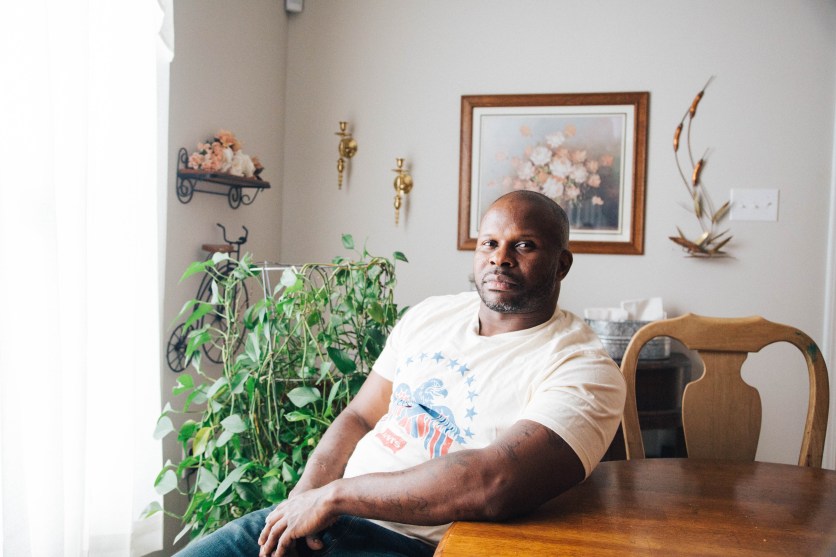
A polling station is shown at Nottingham Elementary School in Arlington, Virginia.Win McNamee/Getty
Arlington Street People’s Assistance Network or A-Span is a one-stop shop, offering shelter, meals, and medical services to people who are homeless in Arlington, Virginia, a suburb of Washington, DC. The center is unobtrusive, located on the second floor of an office building in the midst of Arlington’s sprawling municipal center. With its bright yellow lobby, clean waiting room furniture, and potted plants, this could be a dentist’s office, minus the coffee table of expired magazines. By noon, a crowd arrives—as if by appointment—and files into the cafeteria for lunch, to consume just one of the 38,000 meals the center will provide this year. On Tuesday, when, residents of Virginia went to the polls for an off-year election to determine who would control the state legislature, no one at the A-SPAN homeless center was wearing an “I Voted” sticker.
Virginia has some of the strictest voting laws in the nation, a strategy the now-defeated Republican legislators had enacted to keep the state’s political map red. Some of those who have been most affected by those laws are the state’s homeless people, many of whom are already unlikely to vote. Sometimes, voter ID laws get in the way. Sometimes, the correct polling station is inaccessible. Not having a fixed address makes the problems multiply. With a population of 8.5 million and 5.6 million registered voters, there are 5,975 people experiencing homelessness in Virginia—.07 percent of the population.
At any given moment, more than a half a million Americans are on the streets or in designated shelters like the one in Arlington, because they don’t have a place to live. Thanks to an increasingly tight housing market and the decimation of the social safety net, homelessness remains at crisis levels. The federal government began recording the number of homeless people in 2007, when there were 647,258 unsheltered people nationwide. Since then, homelessness had been trending downward but then spiked by 0.3 percent between 2017 and 2018, due to a decline in the number of individuals living in emergency shelters and transitional housing.
Recently, the country’s homeless population has become a point of reference for politicians. In September, President Donald Trump said that the record number of homeless people in Los Angeles and San Francisco “hurt the prestige” of California. Democratic presidential candidate Julian Castro has pledged to end chronic homelessness by 2028. But the national conversation rarely focuses on the homeless as potential voters, even as several federal court cases have solidified their right to vote. But taking a look at what took place during Virginia’s election, illustrates some of the problems that homeless voters are likely to face throughout the country in 2020.
Joe Simmons, whose stocky frame dominates the plastic chair he sits on, is one of the approximately 215 homeless people in Arlington County. He is 49-years old and has been at the center for two weeks following his release from a few months in the county jail for having violated a court order tied to a pair of 2006 felony charges. Simmons says he’d accumulated more than 300 court-instructed community service hours—required as part of his probation—but a filing error prevented those records from reaching the judge, who sent him to jail. After he was released, he returned to the storage unit where he kept all of this possessions. They had all been thrown out.
The incident was disheartening, but not unfamiliar. In 2014, Simmons served time in Arlington for breaking probation tied to the same charges. After his release, he discovered his landlord had deposited everything he owned on the curb. “Back to square one,” he says in a quiet monotone. During his most recent time in jail, some representatives from Offender Aid and Restoration, a Virginia-based restorative justice organization, spoke to him about voting. “Voting would be something new to me because I’ve never done it,” he says. “A person who’s done it numerous times, it’s natural to them. So, I have to research and see what it is I have to do to be able to obtain the rights back.”
Felons are banned from voting in Virginia, but Governor Ralph Northam has provisionally used his executive power to restore those rights to released felons, a trend started in 2016 by his predecessor, Terry McAuliffe. On probation and recently-released, Simmons isn’t sure what his status is, but he appreciates the consequences of casting a ballot. “One vote could tip the balance of who becomes the next senator, the next president, the next sheriff,” he says. “An extra vote counts.”
After we spoke, Mark Magness, who became homeless only the day before after a surprise rent hike unfolded into eviction, walked up to chat. Before he lost his home, his financial situation was sustainable, if fragile. An injury kept him from work long enough to be fired, but he had enough money to get by—until his housing costs doubled. Magness’ polling place is located across the county from A-SPAN, so he can’t afford to get there. This will be the first election in which he has not voted since 1988, when he was 18. “You’re supposed to,” he says. “People fought and died for it. Why am I just going to blow it off? And it makes you more aware of your community.” He regrets not being able to vote in this election but acknowledged some relief that it was not a more important one. “It’s too bad,” he says. “But it’s not the big one. It’s not for senate or governor or president. I can let this one go.” By the next election, Magness plans to be in a stable residence, back in his voting district across the county.
Magness may not see these off-year elections as significant, but advocates point out how the homeless are affected by the decisions of those who are in office in sometimes surprising ways. Everything from new zoning laws to criminalizing loitering can affect where homeless people live and sleep. “They’re a part of the process and their voices should be heard,” Annie Leomporra, a civil rights fellow at the National Coalition for the Homeless, says. “People in this space are dehumanized on a daily basis. One way to bring them back to human status is engaging them in voting.”
And one way to do that is by voter registration drives at homeless shelters. In the months before November’s elections, Spread the Vote*, an organization that takes people to the polls and helps them get government-issued IDs, made regular visits to the A-SPAN homeless shelter. The centralized nature of a homeless shelter may offer voter advocacy groups a place to reach that population, but the high turnover rates bring additional challenges. “Our clients change,” says David Ordonez, the director of shelter programs at A-SPAN. “It could be different individuals one week, and another group another week. They move around so much. When the winter comes, it changes; when the summer comes, it changes.”
Registration, obviously, is only the first step. Today, 35 states require some sort of identification to vote, and Virginia is one of seven states known for having strict voter ID laws. In a 2018 Northern Illinois University study that ranked each state by how easy it is to vote, Virginia came in second to last, only beating Mississippi. In 2013, the state introduced a voter identification law. In order to cast a ballot, Virginians have to provide a valid photo ID, which includes a driver’s license or a passport. Without one, residents only can cast a provisional ballot until they provide proof of identification within three days, or the ballot is not valid.
For a homeless person, maintaining the necessary documents to either acquire a valid ID or use as one is not always easy, especially when they often lose important documents in city-enforced sweeps of their camps. “If you’re not present [during a sweep], they’ll throw away your stuff,” Leomporra explains. “Including your birth certificate and your social security card. And it can take a year to get it back.” Virginia actually offers a voter ID card that’s technically free, but even so, the logistics of acquiring one can involve travel to a different location, that may require funds that aren’t available.
Add that to the fact that the challenges homeless people regularly encounter—hunger, lack of shelter, inadequate clothing—can make civic participation less of a priority. Terrance Toussaint, the programs director at A-SPAN, says convincing people at the shelter to register and vote under those circumstances makes for a tough sell. When addressing groups, he makes voting relevant by tying it to their daily needs. “Hey,” he says. “This is your right in this country, to vote. If you do, you’re helping yourself with the services that you need.” He explains that one strategy is “to point things out to them that they’re getting now, that they’re benefiting from now. The fact that you’re even in this building is because someone took that opportunity to say, ‘You need this.’ And you do that by voting.”
After more than a decade of working with various populations at A-SPAN, Toussaint knows not to expect anything more than a cautious response. But if he can get a few people willing to go to the polls, he knows he’s made his mark. “The hope is to get maybe two or three in the group to understand,” Toussaint says. “One person gets the information, and it spreads like wildfire. The conversation continues with those people to the rest of the population.”
Sometimes, that information can infect an entire facility. Randy Moore, the director of policy and advocacy for the Virginia Housing Alliance, remembers when he ran a voter registration drive at a homeless shelter. “It was the largest line of people checking their [voter] status,” he recalls. At many shelters nationwide, registering to vote is part of the intake process. But shelters are notoriously not stable housing. Not everyone remains there for reasons of safety or space.
“We went out to our local parks to see if anyone wanted to register,” Leomporra, says about her work in Washington, DC, with its large homeless population of 6,521. “It can be hit or miss, but it’s an effective approach.” But even if the people they reach out to aren’t receptive to registration, just getting the word out about voting rights can help. “It’s also an education,” she explains. “They can talk to a friend about it and hopefully that collectivism will perpetuate people to vote.”
Ordonez recalls a years’ long effort to get Jerry, one of his clients, a photo ID card. They had a good relationship, but Jerry, a bearded veteran who’d served in Iraq, was infamous for his uncanny ability to disappear. “I would see him on the street and try to get a hold of him for those two minutes of talking to him,” he says. “I would turn around, he’s gone.” After two years of those interaction, Ordonez delivered the ID. “The first thing he said to me: ‘Hey Dave I want to tell you something. I feel like I’m a human again just getting this,'” Ordonez recalls. “A lot of them get mistreated out there.’”
Even if a homeless person has managed to obtain an ID card and register to vote, just getting to the polls can be the final obstacle. “Transportation is often the biggest barrier,” Moore says about voting in Virginia. Polling stations are determined by the place of registration, so homeless people, who tend to be more transient, often struggle to return to wherever they first registered. Many cities in Virginia have limited, or expensive public transportation, and polling stations are often difficult to find. Advocates have tried to fill the gap by offering some transportation service from homeless shelters on voting day, but there is always a problem when trying to find a way to bring voters with extremely limited resources to the polls.
“Part of dealing with homelessness is making people feel like they’re part of a community,” Steve Berg, the vice president of programs and policy at the National Alliance to End Homelessness says. “And being a voter and making decisions about elected officials is part of of belonging to a community.”
Correction: An earlier version of this article misidentified Spread the Vote as a voter registration organization.


















